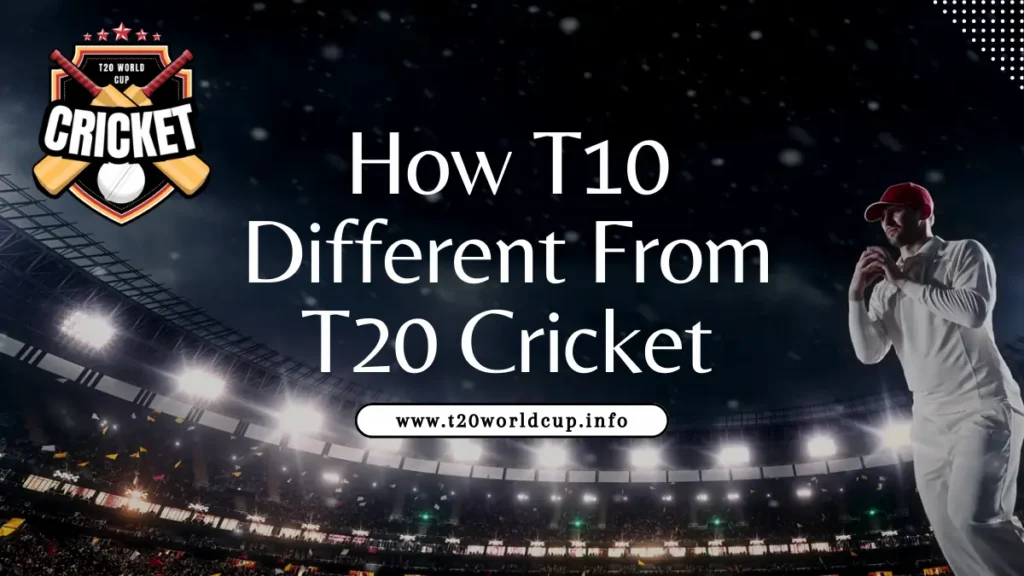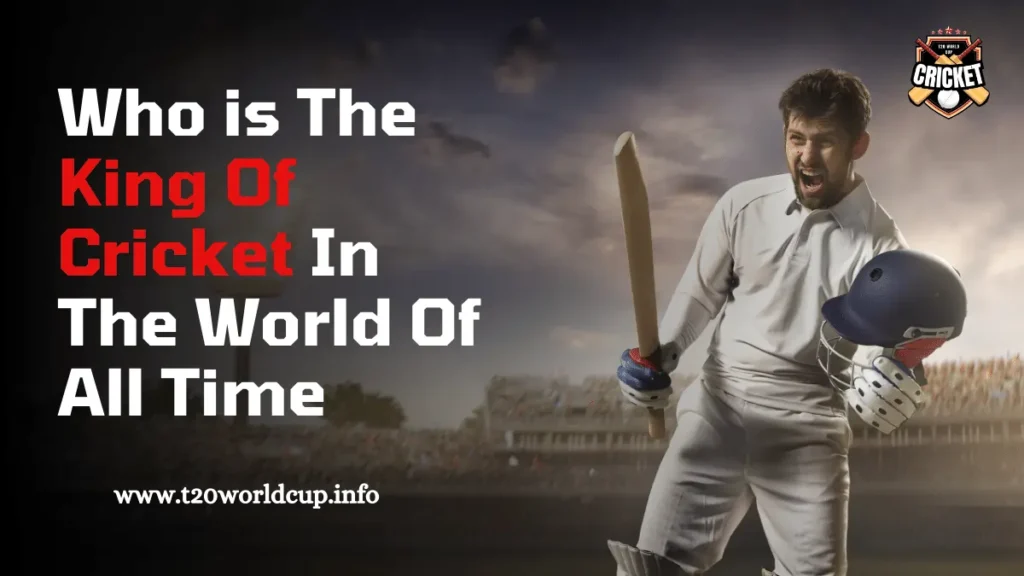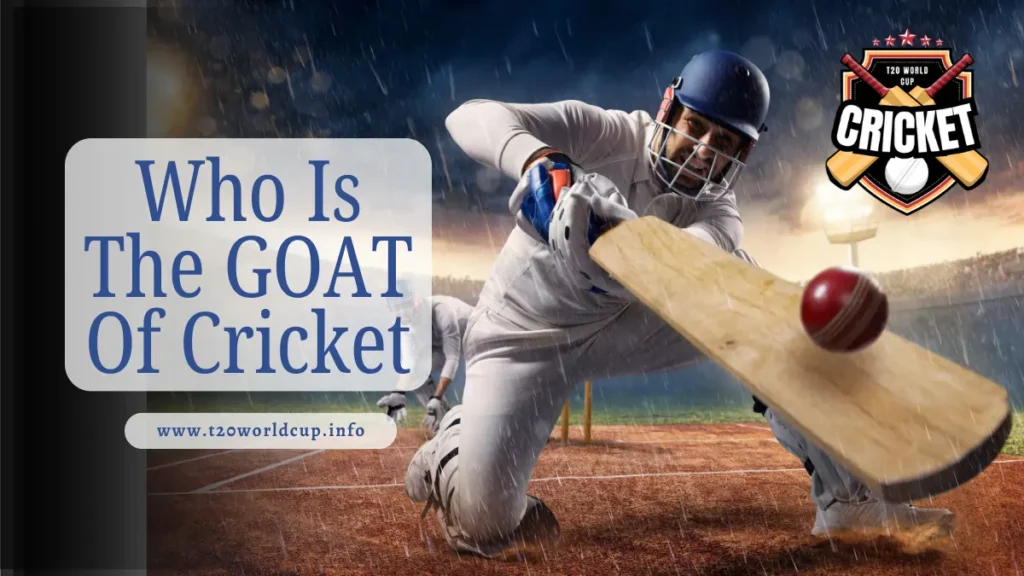Cricket, frequently hailed as a gentleman’s game, has developed throughout the long term, adjusting to the speedy requests of present-day sports devotees. In this steadily evolving scene, the rise of curtailed formats like T10 and T20 has added another aspect to the cricketing scene. While the two arrangements guarantee invigorating interactivity pressed into more limited spans, they accompany their arrangement of rules, systems, and rushes.
In this blog, we tackled translating the complexities separating T10 from T20 cricket. We dig into the quintessence of each format, exploring the essential subtleties that put them aside and examining the effect these distinctions have on the game and its players. Whether you’re a carefully prepared cricket fan or a rookie to the game, go along with us as we disentangle the cricketing code and gain a more profound comprehension of what makes T10 not the same as T20.
History of T10 Cricket
T10 cricket boasts a brief yet impactful history, revolutionizing the cricketing experience with its fast-paced format. Here’s a glimpse into its journey:
- Origin: T10 cricket wasn’t made by the Emirates Cricket Board (ECB). All things being equal, T Ten Games The executives, a privately owned business, conceptualized and presented the organization in the UAE. Going for the gold-quick cricketing experience, they consolidated the customary configuration, finishing matches within a few hours.
- Launch: The debut T10 competition, the Abu Dhabi T10 League, was sent off in December 2017. This six-group team competition included a cooperative configuration followed by end-of-the-season games, with matches played at 10 overs for each side. Held at the Sharjah Cricket Stadium in the UAE, it collected huge consideration because of its curiosity and the cooperation of global stars.
- Expansion and Recognition: Following the first edition’s success, T10 cricket picked up speed. The Abu Dhabi T10 League extended in the resulting years, drawing in additional groups and top ability. The configuration got a huge lift in 2018 with the International Cricket Committee’s (ICC) official assent, lending credibility and preparing for additional development.
- Evolution and Global Reach: T10 cricket has constantly developed, presenting vital breaks, player drafts, and other fan-connecting components to improve the onlooker experience. The arrangement has likewise spread past the UAE, with associations and competitions coordinated in India, Pakistan, and Sri Lanka. This worldwide extension has cemented T10 cricket’s situation as a well-known and practical cricketing format.
- Impact: T10 cricket’s impact on the cricketing scene is obvious. It gives a stage to laid-out and emerging players to showcase their abilities in a high-pressure climate. This speedy configuration has drawn in new fans, offering an exhilarating option in contrast to customary cricket.
Difference Between T10 And T20 Cricket
| Aspect | T10 Cricket | T20 Cricket |
| Overs per Side | 10 | 20 |
| Total Overs | 10 | 20 |
| Duration per Innings | 45 minutes to 1 hour | Around 3 hours |
| Fielding Restrictions | 2 fielders outside the 30-yard circle throughout the innings | Powerplay (first 6 overs): 2 fielders outside the 30-yard circle; restrictions ease later |
| Strategic Timeout | Usually, one per innings | Typically, one per inning (may vary by tournament) |
| Match Duration | Typically completed within 90 minutes | Typically completed within 3-4 hours |
| Batting Approach | Aggressive from the outset | Balanced approach with room for building innings |
| Bowling Strategies | Bowlers under constant pressure | Bowlers have more overs to strategize |
| Player Specialization | Explosive batting, bowlers with tight lines and variations | Mix of aggressive and accumulative batting, varied bowling styles |
| Overall Pace | Extremely fast-paced | Fast-paced but with more strategic maneuvering |
Rules Of Ten10 Cricket
Here’s a detailed breakdown of the rules governing T10 cricket:
General Play
- Teams: Each team consists of 11 players on the field, similar to traditional cricket formats.
- Overs: Each team bats for a maximum of 10 overs (60 legal balls) per inning, significantly shorter than T20 cricket.
- Innings Structure: Unlike T20, there’s no designated “powerplay” period with specific fielding restrictions. However, the aggressive nature of the format often leads to power-hitting from the outset.
- Innings Break: Similar to other cricket formats, a break between innings allows teams to strategize and bowlers to rest.
Match Duration
- Due to the limited-overs, T10 matches are incredibly fast-paced, typically lasting around 90 minutes. This brevity makes them ideal for a quick dose of cricketing excitement.
Batting and Scoring
- Runs: Runs are scored in the same way as traditional cricket formats, with boundaries (fours and sixes) playing a more significant role due to the need to score quickly.
- Loss of Wicket: Similar to other formats, a batsman is considered out upon dismissal. There are various dismissal methods, such as bowled, caught, LBW, etc.
Bowling
- Overs per Bowler: A bowler can bowl a limit of two overs (12 lawful balls) per inning. This guarantees various bowlers have an opportunity and keeps the game dynamic.
- No-balls and Wides: Like different formats, no-balls and wides cause punishment runs and an additional ball. T10 competitions could have explicit standards regarding the number of runs granted for these infractions.
Fielding Restrictions
- Standard Fielding: Unlike T20, where restrictions ease after the powerplay, T10 cricket often has a rule where only 2 fielders are allowed outside the 30-yard circle throughout the innings. This encourages aggressive batting and high scores.
Super Over (Tie-Breaker)
- If the final score is tied after both teams have batted, a Super Over decides the winner. Each team nominates three batsmen and one bowler for this one-over shootout. The team scoring the most runs in their Super Over wins the match.
Other Considerations
- Strategic Timeouts: Tournaments might allow a limited number of strategic timeouts per inning for captains to strategize.
- Match Officials: Similar to other cricket formats, T10 matches have umpires to adjudicate wides, no-balls, and dismissals. A referee might also be present for overall match management.
Which Is Better T10 Or T20?
There’s no definitive answer to which format, T10 or T20, is “better.” It ultimately boils down to personal preference and what kind of cricketing experience you seek:
If you prefer:
- Fast-paced action with explosive batting: T10 is the clear winner. With its limited overs and stricter fielding restrictions, it offers a non-stop thrill ride focused on power-hitting and quick decision-making.
- A balanced approach with room for strategy: T20 might be a better fit. It allows for a blend of aggressive batting, strategic bowling, and building partnerships, making it a more well-rounded cricketing experience.
- A substantial cricketing experience: Opt for T20. Its longer format allows for a more elaborate display of cricketing skills and tactics by players.
- A quick dose of cricketing excitement: T10 matches are ideal, typically lasting around 90 minutes.
Here’s a table summarizing the key points to consider:
| Aspect | T10 Cricket | T20 Cricket |
| Focus | Explosive batting, quick results | Balanced approach, strategy |
| Pace | Extremely fast-paced | Fast-paced but allows for more strategy |
| Duration | Around 90 minutes | Around 3 hours |
| Fielding Restrictions | Stricter (often only 2 fielders outside the 30-yard circle throughout) | Powerplay exists, then more flexibility |
| Bowling Strategies | Focus on tight lines and variations | More time for strategizing, mix of aggression and containment |
Ultimately, both T10 and T20 have carved their niches in the cricketing world. T10 offers a new dimension of excitement, while T20 remains a more established and strategic format. The best choice depends on your preference for the pace, strategy, and overall cricketing experience you enjoy.
Final Words
The distinctions between T10 and T20 cricket go beyond how long they last. They incorporate how the games are set up, the systems utilized, and how players play out, all of which shape each organization’s experience. While T10 cricket is high-speed and enthusiastic, T20 cricket offers a more itemized and vital skill that requires lifelong fans and relaxed watchers.
T10 and T20 cricket mix it with cricketing entertainment, demonstrating how the sport can change and adjust to fans’ needs. Cricket unites individuals to praise ability, physicality, and affection for the game.
Whether you prefer the quick action of T10 cricket or the strategic depth of T20 matches, both formats have greatly impacted the cricket world. They show how cricket can evolve and stay popular no matter what changes happen. Most importantly, they keep fans engaged and excited, leaving a lasting impression on everyone who watches.
FAQs- How T10 Different From T20 Cricket
Which format is faster-paced, T10 or T20 cricket?
Both formats are fast-paced, but T10 cricket is even more furious due to the condensed nature of the game.
Are there any T10 cricket leagues apart from the T10 League?
Yes, T10 cricket has seen the emergence of various leagues worldwide, including the Abu Dhabi T10 League, which has gained popularity among fans and players.
Are there any strategic elements unique to T10 cricket?
Yes, T10 cricket often includes strategic timeouts, similar to those in T20 matches, allowing teams to regroup and plan their approach during the game.



